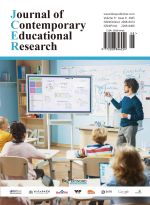Cultivating Cosmetics Talents through the Holistic Education Approach: A Case Study of Guangdong Pharmaceutical University
Abstract
With the rapid growth of the cosmetics industry, the demand for diversified and interdisciplinary talent is increasing. However, a structural mismatch persists between current educational approaches and industry needs, particularly in aligning with the holistic education model, which emphasizes moral, intellectual, physical, aesthetic, and labor development. To bridge this gap, Guangdong Pharmaceutical University has implemented a comprehensive reform of its holistic education system, aiming to cultivate well-rounded cosmetics professionals. Key initiatives include integrating professional ethics into moral education, strengthening the integration of theory and practice in intellectual training, emphasizing skin health management in physical education, enhancing aesthetic appreciation and creative thinking, and promoting labor spirit and practical skills through hands-on experiences. These reform efforts have yielded significant results, contributing high-quality talent to the cosmetics industry and offering a valuable model for other institutions seeking to align education with industry demands.
References
Evans P, Pucik V, Stahl G, et al., 2025, Global talent management in an age of disruption, Organizational Dynamics, 101149–101162.
Koh A, Razak A, 2024, Teachers’ talent management and personal quality ensure a better tomorrow in education, International Journal of Educational Management, 38: 1540–1557.
Liu Y, 2023, An innovative talent training mechanism for maker education in colleges and universities based on the IPSO-BP-enabled technique, Journal of Innovation & Knowledge, 8: 100424–100437.
Brown P, Sadik S, Xu J, 2021, Higher education, graduate talent and the prospects for social mobility in China’s innovation nation, International Journal of Educational Research, 109: 101841–101855.
Jin T, 2025, Methods and reliability study of moral education assessment in universities: A machine learning-based approach, Alexandria Engineering Journal, 125: 20–28.
Bernasconi M, Profeta P, 2012, Public education and redistribution when talents are mismatched, European Economic Review, 56: 84–96.
Liu L, Zaman U, 2025, From leadership to innovation: Psychological mechanisms behind teacher creativity in physical education, Acta Psychologica, 255: 104965–104977.
Liu Y, Zhang S, Jiang Z, et al., 2025, Sensing the beauty of interface: Neural oscillatory correlates of visual aesthetic judgment, Behavioural Brain Research, 489: 115623–115633.

